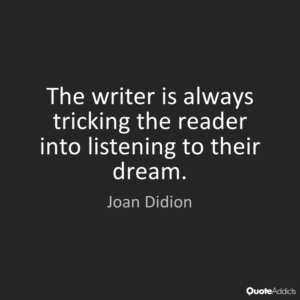Writers don’t tend to talk openly about their disappointments. It’s too revealing and often too painful. But we’ve all had them in one form or another, whether it’s a prize we didn’t get or a book that bombed.
My biggest one in a decades-long career came by way of an agent. This wasn’t your ordinary agent. Oh, no. She was one of the biggest in the country, with clients on the best seller list and a history of major deals.
When she read my book, she gave me the kind of feedback for making changes you’d expect from the best, smartest, most tuned-in editor. And her emails were as upbeat as the “Battle Hymn of the Republic.”
Working with her her was like jamming with a fellow jazz musician–we were so much in sync. But there were some false notes. She wanted the book to open in a way I thought was deadly dull, and she wanted to change the title to something awful.
I won about the title, but caved on the opening. Maybe she saw something I didn’t? Then she she arranged meetings in New York with almost two dozen bigwigs in publishing–people at the very top of their houses or imprints, people I’d read about but never dreamed would be looking at a book of mine.
Her talk was as bold and inspiring as her editorial advice. There was going to be an auction, and she thought $100,000 was a good floor. This was dizzying to someone who’d never gotten more than a $15,000 advance on a book.
Then the bomb dropped. She launched her campaign to sell my book just before Thanksgiving, even though I’d expressed some anxiety about that, I’d always thought the period from Thanksgiving to New Year’s was when publishing slowed way, way down. At least in my experience, and I had published quite a few books by then. On top of that, the stock market had collapsed in New York, publishers were firing staff and in a state of panic.
I’ll never know if she would have sold the book in a better financial climate, but I do that when she failed, know she dropped me in a New York minute, wouldn’t consider revisions and acted as if as if I had somehow disappointed her. Her advice at that point was brief: “Why don’t you write a memoir? Those are flying out the door!” And then she handed me off to her assistant.
I was crushed. That’s not hyperbole. Six years later, the wound of being revved up by her and then dropped still stings.
I told her I’d already written a memoir that was being published (and had sold before I signed with her) and couldn’t write another on command. Besides, even if I could, I wondered if she would have as much success with a memoir of mine as she had with my novel.
Ironically, that memoir hadn’t earned me much of an advance, but when it was published soon after this debacle, it scored me dozens of very well-paid speaking gigs in the U.S., Canada, and Germany. I made many new friends, And then I sold my current and future literary papers to Michigan State University’s Special Archives for a satisfying sum at a time when authors I know were having trouble giving their papers away.
A very dark time turned deeply fulfilling, almost magical. As we say in New York, “Who knew?” When I related this crazy sequence of events to a friend, he said, “Writers can be as normal as anyone else, but their lives are manic depressive.” And he couldn’t be more right. We go from high to low, sometimes within the same day, our careers as crazy as the stock market, trying to hold onto what really matters: the work we’ve devoted our lives to.
Lev Raphael is the author of Writer’s Block is Bunk and 24 other books in genres from memoir to mystery. His work is taught in colleges and universities across the U.S. and has been translated into 15 languages. You can read more about his books at his web site.

 Lev Raphael is the author of 25 books in genres from memoir to mystery which you can find on
Lev Raphael is the author of 25 books in genres from memoir to mystery which you can find on 

![[cover]](https://www.levraphael.com/images/cover_mygermany_152.jpg)